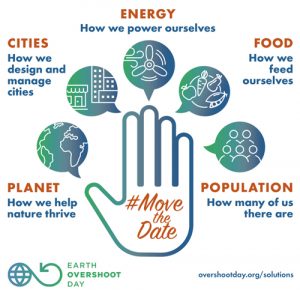We had no idea what 2020 had in store for the world when we kicked off the year with a clear intent: amplifying our impact through the new decade. Given all the challenges of the year, we are pleased with what we were able to achieve and the impact it generated.
Gaining traction with Earth Overshoot Day
The date of Earth Overshoot Day 2020 was pushed back 24 days due to pandemic-induced lockdown measures around the world, according to the results published by our research team. Did we mention, by the way, how proud we are of their hard work gathering and analyzing data in extraordinarily challenging and volatile circumstances? As we’ve discussed time and time again, the later date was no victory as it came at a significant cost of human pain and suffering. That is not what sustainability is about. At the same time, the fact that our world could shift dramatically in a relatively short timeframe acted as a powerful wake-up call for many. It inspired us to ask the question: What if we design the shift we want in order to move towards one-planet prosperity, rather than letting disaster dictate the terms?
 Guided by the five key areas of sustainability in our #MoveTheDate hand symbol (right), the provocative new content and visuals we shared were received with interest and intrigue! What is the fossil fuel intensity of our food? Is it helpful to discuss population? (We asked people all over the world and especially loved what Florence Blondel had to say.) Additional research from our team showed Scotland may become a new biocapacity leader and Australia may be running a biocapacity deficit for the first time in its history!
Guided by the five key areas of sustainability in our #MoveTheDate hand symbol (right), the provocative new content and visuals we shared were received with interest and intrigue! What is the fossil fuel intensity of our food? Is it helpful to discuss population? (We asked people all over the world and especially loved what Florence Blondel had to say.) Additional research from our team showed Scotland may become a new biocapacity leader and Australia may be running a biocapacity deficit for the first time in its history!
Moreover, despite the media narrative in 2020 being dominated by the pandemic and tumultuous US elections, the Earth Overshoot Day campaign was another peak in coverage, receiving more than 4 billion media impressions. It also received boosts by social media initiatives from UNEP’s and UNICEF’s Brussels offices, in collaboration with the European Commission’s DG Environment, featuring youth sharing how they #MoveTheDate. Government officials in multiple countries acknowledged the significance of Earth Overshoot Day, including France’s president Emmanuel Macron and EU president Ursula von der Leyen. The opportunity to communicate on sustainability issues provided by Earth Overshoot Day was recognized by many members of the business community, as a record number of companies and entrepreneurs made a point of giving the day a nod.
Data as the guiding light
2020 brought opportunities to widen the use of Ecological Footprint data and to address its limitations. For the first time since the independent entity Footprint Data Foundation (FoDaFo) was established, the Ecological Footprint Initiative at York University in Toronto led the annual production of the National Footprint and Biocapacity Accounts. In tandem with this shift, we took the opportunity to address limitations of the Ecological Footprint methodology and its criticisms in a comprehensive guidebook written for Ecological Footprint practitioners and the users of its results.
The Footprint gained further recognition as a valuable sustainability metric in multiple mainstream economics reports, including the UNDP’s Human Development Report, the World Economic Forum’s Global Competitiveness Report, and the upcoming Dasgupta Review.
Engaging the business world
Our ongoing partnership with Schneider Electric over the past three years yielded an e-book which we intend to be a catalyst for meaningful reflection, conversation, and action on business strategy in a world increasingly shaped by climate change and the scarcity of ecological resources. Meanwhile, Schneider Electric’s Chief Strategy & Sustainability Officer Olivier Blum co-authored this op-ed in Le Monde with Mathis Wackernagel, while CEO and Chairman Jean-Pascal Tricoire posted this video statement on Twitter.
Partnering with a government powerhouse
Global Footprint Network amplified its partnership with the Scottish Environmental Protection Agency (SEPA) to position one-planet prosperity as a necessary path for successful businesses, societies, and governments. Although the Glasgow-hosted COP26 was postponed to 2021, we highlighted the relevance of climate change with online events – including the launch of Earth Overshoot Day — organized in partnership with SEPA and the University of Glasgow. Some of those events drew more than 1,000 live participants with powerful contributions from leaders from around the world.
Influencing national and regional strategies
The pandemic did not stop us from continuing our work “on the ground.” In Slovenia, we completed a project to support the design of the national strategy for sustainable development. In Portugal, 12 more cities joined the Footprinting project, with now 20 municipalities incorporating the Ecological Footprint in their development strategy, including improved communication with all stakeholders through custom-tailored Footprint Calculators.
Powerful tools for education
The number of people who explored our open data platform throughout 2020 grew more than 30% year-over-year up to nearly half a million users. The Footprint Calculator has remained a powerful tool to raise public awareness of the Ecological Footprint, in particular among youth with students making up more than half of the 3 million annual Calculator users. In fact, education stood at the forefront of our priorities in 2020. The ERASMUS+-funded EUSTEPs project successfully met all its goals, including completing the development of a new teaching module and making it available online for faculty. Developing custom-tailored Footprint Calculators for university campuses is next on the agenda.
Exploring ecotourism
Although 2020 was less than a good year for travel, ecotourism got a boost thanks to a free online course designed to teach the participatory process of creating ecotourism experiences in and around Mediterranean Protected Areas, complementing the ecotourism calculator. Course attendees are also introduced to the concept of the Ecological Footprint and learn how it is used to support ecotourism development and monitoring. The course was developed by IUCN Med, Global Footprint Network and the MEET Network, with support from MAVA Foundation. Here’s to 2021 being the year when travelers get more opportunities than ever before to enjoy our beautiful planet while contributing to its regeneration.



